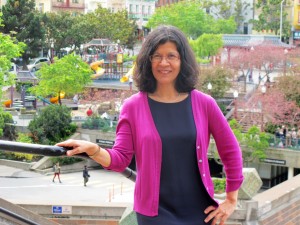
Ileana Fohr ’14 is currently pursuing her M.S.W. in the Adelphi University School of Social Work.
“They never come to us and say, ‘I’ve been trafficked.’ They know something happened to them, but they don’t know what.”
This is how Ileana Fohr ’14, intensive case manager for Safe Horizon’s Anti-Trafficking Program and current M.S.W. student in the Adelphi University School of Social Work, describes the survivors of human trafficking she assists. She said most come from countries such as the Philippines, South and Central America, Africa and Eastern Europe. While the percentages of individuals trafficked for labor—such as agricultural work, hospitality, domestic service—are split between male and female, women comprise the majority of her clients trafficked into the sex industry.
Fohr said the effects on victims include malnutrition, sexually transmitted diseases and forced abortion. Psychologically, she cites low self-esteem, hypervigilance, insomnia and an inability to make decisions.
Working with clients as a one-on-one case manager, she coordinates with Safe Horizon’s in-house, pro bono attorneys, the medical and mental health community and other service providers. Just as important, she offers emotional and moral support. “We tell them there are others this has happened to; we normalize the situation. They say, ‘Just knowing you understand what I’ve been through and what has happened to me, that’s a lot.’”
While some of her clients who have been trafficked never recover from their psychological symptoms, others display remarkable resilience. Fohr tells of one woman who was forced into the sex industry in her home country. Her trafficker, who was also the father of her children, insisted she come to the United States “because that’s where the money was,” she said. “She had no option because he used her son and daughter as pawns. When she came to us, she didn’t know what to do. She was terrified of this man—even though he was in another country, he had such a hold on her. She felt compelled to continue working in the sex industry and sending money home. Then she realized what was happening and said, ‘That’s it, I’ve had it.’ And she started the healing process.”
The woman received immigration relief, was reunited with her daughter (her son unfortunately chose to stay with his father) and got a job. “The change from the beginning of, ‘I can’t do this, he controls me,’ to now she’s empowered, makes her own decisions…it’s amazing to see,” Fohr said. “And it happens to a lot of our clients.”
Fohr herself has a compelling story to tell. Born in Guatemala, she was 10 years old when her mother, a human rights activist, was taken by the secret police. Fohr never saw her mother again. After coming to the United States and raising a family, Fohr’s passion for human rights and social justice led to her decision to become a social worker and enroll in Adelphi’s B.S.W. program. She held the position of B.S.W. student-at-large for the National Association of Social Workers (NASW)-New York City chapter and raised awareness of human trafficking at Adelphi’s 2014 Social Action Day. She is now in the M.S.W. program at Adelphi, where she plans to specialize in treating trauma and helping meet the need for Spanish-speaking, trauma-informed social workers.
Finding Hope After a Life of Trauma
The trauma track Fohr is joining is part of a recent initiative at Adelphi, the Institute for Adolescent Trauma Treatment and Training. Co-directors Victor Labruna, Ph.D., and Mandy Habib, Psy.D., have witnessed firsthand young women who have been trafficked, forced into prostitution or abused by their own families or those who were supposed to care for them.
The trauma experienced by women who survive chronic abuse is insidious and ingrained. “People hear the word trauma and think of PTSD [post-traumatic stress disorder],” Dr. Habib said. “But PTSD doesn’t begin to capture all of it. A one-time traumatic event might not change your entire worldview. But being abused and treated like property, or as less than a human being, changes the way you think.” Survivors of gender-based violence, she said, “feel like they’re damaged goods not worthy of anything. They lose any sense of hope.”
The institute is training students and mental health professionals to identify and treat complex trauma. “How do you change something that’s been ingrained in someone for 30 or 40 years?” Dr. Labruna added. “It’s not impossible, but it’s difficult. It’s balancing listening with gently encouraging and giving them hope that it can be different—there is another world.”
—Ela Schwartz
For further information, please contact:
Todd Wilson
Strategic Communications Director
p – 516.237.8634
e – twilson@adelphi.edu